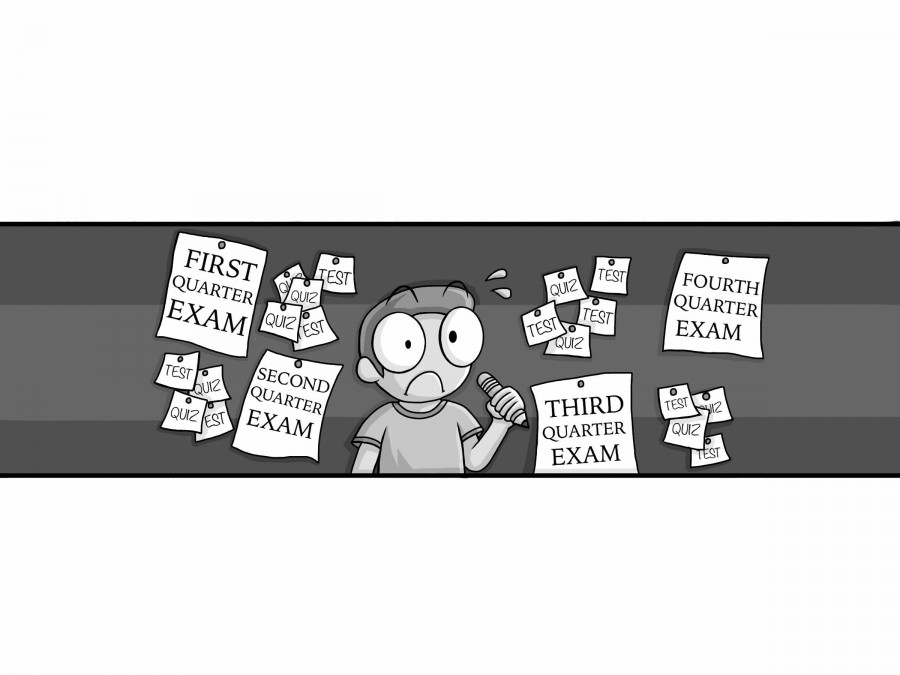Quarter Exams Only Add More Stress
September 29, 2015
Those two weeks in January and June that you have reserved for stress, tears, and nights of poring over notes? Go ahead and schedule two more. Every nine weeks, to be exact.
MCPS has decided to replace two-hour semester exams twice a year with 45-minute quarter exams four times a year, starting as soon as this spring for middle schools and next school year for high schools.
Though the intent is to maximize instructional time and relieve the pressure of semester exams, the added stress, confusing grading curve and overall inconvenience makes the decision a faulty one.
According to a Sept. 8 public announcement, MCPS decided to alter testing because the parents and community expressed interest in maximizing the amount of instructional time in schools. With HSAs, PARCC, APs, semester exams and the average unit test or quiz, they felt testing had encroached on instructional time.
The ironic part is that these complaints have only hurt students. While MCPS is required to administer state tests like the HSA and PARCC, they can choose when to administer semester exams. But now instead of two exams, there will be four.
However, replacing semester exams with quarterly ones doesn’t allow for more instructional time. In fact, it’s more likely to make that time even more rushed and pressure-filled for students and staff who have to learn and teach within a much shorter time limit.
At CHS, teachers can set test dates for their classes and have the flexibility to move those dates if material hasn’t been covered yet. However, MCPS will set the dates of quarter exams, which doesn’t allow staff and students the ability to teach and learn at an appropriate pace.
The idea behind maximizing instructional time is that students are less focused on doing well on tests and more concentrated on learning material for the sake of learning. However, given that quarter exams will make up a significant portion of a student’s quarter grade, pressure and stress are only going to increase.
According to the MCPS public announcement, quarter exams will be worth 25 percent of a student’s quarter grade.
The grading chart used with semester exams allowed students to work hard for quarter grades, but still have enough “wiggle room” with semester exams so as to prevent too much accumulated stress around exam time. This rewarded students who worked hard throughout each quarter, rather than students who crammed for one test at the end of the semester. The quarter exam policy does the opposite.
According to the MCPS Grading Option Overview, the grading policy may function the same way that it would if a class did not have a semester exam, which formulates grades by trend. If a student earns an A first quarter and a B second quarter, the final semester grade will be a B. If that order is flipped, then the student receives an A.
The idea behind this is that a student will receive a better semester grade for improving quarter grades, but the reasoning doesn’t coincide with curriculum. A student could very well earn an A first quarter, but second quarter earn a B simply because the course consisted of extremely hard material second quarter. Then, because grades are based on trend, that student would earn a B for the semester.
Twenty-five percent is a lot, and that one quarter exam could change a student’s grade as much as two letter grades if he or she has had a bad day.
Though it is still undecided whether the county or individual teachers will create the quarter exams, most CHS students can agree that, while challenging, county exams tend to be easier than ones written by CHS teachers. If teachers are tasked with creating quarter exams, anxiety will only increase.
However, teachers may surprise us. The introduction of required quarter exams in departments that don’t already test every nine weeks means that exams may have to be created, or teachers have to get creative as to what constitutes an exam.
According to Social Studies Department Head Rodney Van Tassell, alternatives to exams would include essays, presentations and projects.
However, according to Science Department Head Clinton Brown, though students might have an easier time in high school without semester exams, they will be at a disadvantage in college, where they’ll have to compete with freshmen who know how to prepare for major exams that cover a semester’s worth of material.
Though CHS students may still have a solution to this by taking an ever-increasing number of APs, students who are taking on-level or honors classes won’t have that chance.
According to Van Tassell, studying for cumulative exams like APs is a skill that students need to have prior to college. While AP students are required to develop the skill, non-AP students can only rely on standardized tests like the PARCC assessments, which may not prepare non-AP students for college exams because they aren’t cumulative exams that reflect school curriculum.
It’s very likely that not changing anything at all would have been a bit more convenient and sensible. Semester exams allow teachers enough time to get through curriculum, give students an extra chance to prove themselves while requiring them to work hard throughout both quarters and prepare students for college exams in the best way that high school can.
Either way, it’s pretty clear that the MCPS decision, while intended to relieve pressure on students, will backfire. It brings new meaning to the phrase—if it ain’t broke, don’t fix it.


